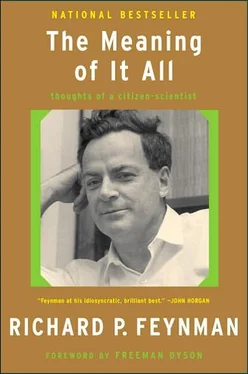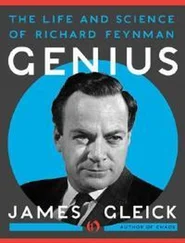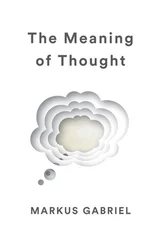These things seem obvious, but people do not pay enough attention to them in deciding scientific questions or questions on the periphery of science. There could be a certain amount of sense, for example, in the way you analyze the question of whether stocks went up or down because of what the President said or did not say.
Another very important technical point is that the more specific a rule is, the more interesting it is. The more definite the statement, the more interesting it is to test. If someone were to propose that the planets go around the sun because all planet matter has a kind of tendency for movement, a kind of motility, let us call it an “oomph,” this theory could explain a number of other phenomena as well. So this is a good theory, is it not? No. It is nowhere near as good as a proposition that the planets move around the sun under the influence of a central force which varies exactly inversely as the square of the distance from the center. The second theory is better because it is so specific; it is so obviously unlikely to be the result of chance. It is so definite that the barest error in the movement can show that it is wrong; but the planets could wobble all over the place, and, according to the first theory, you could say, “Well, that is the funny behavior of the ‘oomph.’”
So the more specific the rule, the more powerful it is, the more liable it is to exceptions, and the more interesting and valuable it is to check.
Words can be meaningless. If they are used in such a way that no sharp conclusions can be drawn, as in my example of “oomph,” then the proposition they state is almost meaningless, because you can explain almost anything by the assertion that things have a tendency to motility. A great deal has been made of this by philosophers, who say that words must be defined extremely precisely. Actually, I disagree somewhat with this; I think that extreme precision of definition is often not worthwhile, and sometimes it is not possible—in fact mostly it is not possible, but I will not get into that argument here.
Most of what many philosophers say about science is really on the technical aspects involved in trying to make sure the method works pretty well. Whether these technical points would be useful in a field in which observation is not the judge I have no idea. I am not going to say that everything has to be done the same way when a method of testing different from observation is used. In a different field perhaps it is not so important to be careful of the meaning of words or that the rules be specific, and so on. I do not know.
In all of this I have left out something very important. I said that observation is the judge of the truth of an idea. But where does the idea come from? The rapid progress and development of science requires that human beings invent something to test.
It was thought in the Middle Ages that people simply make many observations, and the observations themselves suggest the laws. But it does not work that way. It takes much more imagination than that. So the next thing we have to talk about is where the new ideas come from. Actually, it does not make any difference, as long as they come. We have a way of checking whether an idea is correct or not that has nothing to do with where it came from. We simply test it against observation. So in science we are not interested in where an idea comes from.
There is no authority who decides what is a good idea. We have lost the need to go to an authority to find out whether an idea is true or not. We can read an authority and let him suggest something; we can try it out and find out if it is true or not. If it is not true, so much the worse— so the “authorities” lose some of their “authority.”
The relations among scientists were at first very argumentative, as they are among most people. This was true in the early days of physics, for example. But in physics today the relations are extremely good. A scientific argument is likely to involve a great deal of laughter and uncertainty on both sides, with both sides thinking up experiments and offering to bet on the outcome. In physics there are so many accumulated observations that it is almost impossible to think of a new idea which is different from all the ideas that have been thought of before and yet that agrees with all the observations that have already been made. And so if you get anything new from anyone, anywhere, you welcome it, and you do not argue about why the other person says it is so.
Many sciences have not developed this far, and the situation is the way it was in the early days of physics, when there was a lot of arguing because there were not so many observations. I bring this up because it is interesting that human relationships, if there is an independent way of judging truth, can become unargumentative.
Most people find it surprising that in science there is no interest in the background of the author of an idea or in his motive in expounding it. You listen, and if it sounds like a thing worth trying, a thing that could be tried, is different, and is not obviously contrary to something observed before, it gets exciting and worthwhile. You do not have to worry about how long he has studied or why he wants you to listen to him. In that sense it makes no difference where the ideas come from. Their real origin is unknown; we call it the imagination of the human brain, the creative imagination—it is known; it is just one of those “oomphs.”
It is surprising that people do not believe that there is imagination in science. It is a very interesting kind of imagination, unlike that of the artist. The great difficulty is in trying to imagine something that you have never seen, that is consistent in every detail with what has already been seen, and that is different from what has been thought of; furthermore, it must be definite and not a vague proposition. That is indeed difficult.
Incidentally, the fact that there are rules at all to be checked is a kind of miracle; that it is possible to find a rule, like the inverse square law of gravitation, is some sort of miracle. It is not understood at all, but it leads to the possibility of prediction—that means it tells you what you would expect to happen in an experiment you have not yet done.
It is interesting, and absolutely essential, that the various rules of science be mutually consistent. Since the observations are all the same observations, one rule cannot give one prediction and another rule another prediction. Thus, science is not a specialist business; it is completely universal. I talked about the atoms in physiology; I talked about the atoms in astronomy, electricity, chemistry. They are universal; they must be mutually consistent. You cannot just start off with a new thing that cannot be made of atoms.
It is interesting that reason works in guessing at the rules, and the rules, at least in physics, become reduced. I gave an example of the beautiful reduction of the rules in chemistry and electricity into one rule, but there are many more examples.
The rules that describe nature seem to be mathematical. This is not a result of the fact that observation is the judge, and it is not a characteristic necessity of science that it be mathematical. It just turns out that you can state mathematical laws, in physics at least, which work to make powerful predictions. Why nature is mathematical is, again, a mystery.
I come now to an important point. The old laws may be wrong. How can an observation be incorrect? If it has been carefully checked, how can it be wrong? Why are physicists always having to change the laws? The answer is, first, that the laws are not the observations and, second, that experiments are always inaccurate. The laws are guessed laws, extrapolations, not something that the observations insist upon. They are just good guesses that have gone through the sieve so far. And it turns out later that the sieve now has smaller holes than the sieves that were used before, and this time the law is caught. So the laws are guessed; they are extrapolations into the unknown. You do not know what is going to happen, so you take a guess.
Читать дальше











